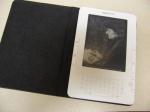The climate for writers is changing as it is changing for so many other professions. At least three writers I know believe that we are approaching a tipping point where a sustainable writing career might slip beyond the grasp of many talented and deserving writers. Contracts written prior to 1994, when Random House modified its contracts to include electronic rights, are subject to interpretation as to whether e-rights are covered. It is primarily these backlist titles that are the focus of much of the current dispute. Large publishers' legal departments see sufficient ambiguity in older contracts to claim the rights advantage before the courts intervene and define these terms for them. While publishers, agents, lawyers and judges argue whether imprecise pre-ebook contract language amounts to legally defined rights, the practical result is denied opportunity for writers. This is not meant to ignore that the economic downturn and the paradigm shift in technology have also forced publishers into an urgent sprint to develop a business model that works for them. My focus here is on writers and their ability to continue to create the raw material required by the publishing industries. Uncertainty in publishing leads to risk aversion among all parties, delay, and ultimately a degraded environment for writers whose professional survival is already a marginal existence. Last night, I dreamed I was a polar bear on a small floating patch of rapidly melting ice. Nothing symbolic there, right?
Are traditional publishing's aggressive responses to the evolving e-book market threatening the careers of writers who invent, research, and craft original literary fiction? Probably not in the long-term, yet it seems that way sometimes.
If you haven't already read it, here is the Authors Guild Dec. 15th Advocacy article, "Random House's Retroactive Rights Grab," in response to Random House CEO Markus Dohle's letter.
Golden Rule
Do unto others as you would have them do unto you
or
He who has the gold makes the rules
Publishers are lining up for a high stakes confrontation with writers and agents. Traditional publishers are positioning for expanded control of individual author's rights, including wrapping e-rights into their traditional print rights contracts. Authors want to share in the revenues produced by e-books at a level that reflects the lower cost of marketing e-books vs. print books. If publishers will not honor this proportionality, then it seems reasonable that authors would want to retain the opportunity to market the e-rights to their books. The Authors Guild sides with the writer. Where will the courts side? Which Golden Rule will guide them? Ultimately, enterprise and economics will decide. In the meantime, we writers have to keep writing, keep finding ways to support ourselves while writing, and keep faith that our work will make a difference.
DISCOVERY of the Day
Melville House Publishing and its informative MobyLives literary blog keep the literary flame burning. For another perspective on the Random House story, take a look at MobyLives' Dec. 16 coverage.





